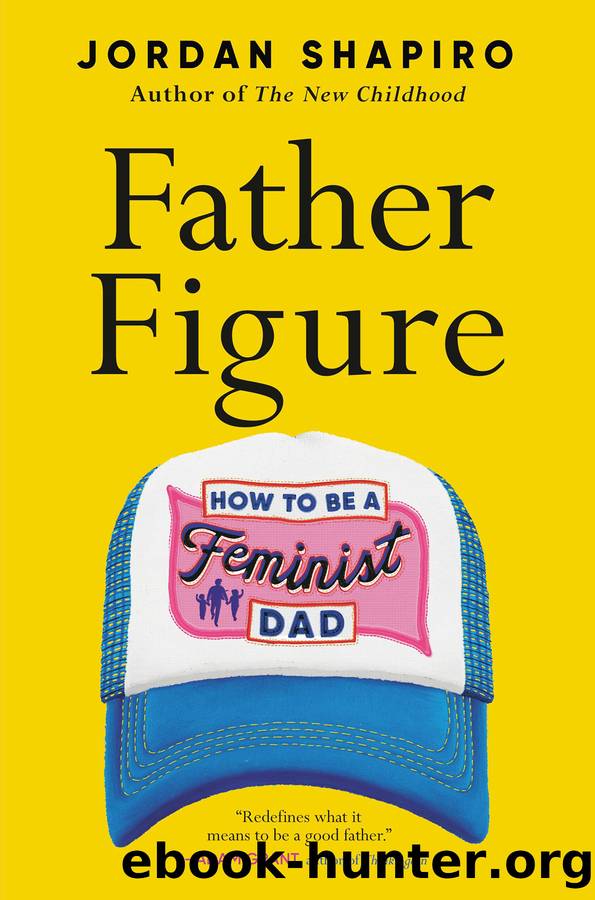Father Figure by Jordan Shapiro

Author:Jordan Shapiro [SHAPIRO, JORDAN]
Language: eng
Format: epub
Publisher: Little, Brown and Company
Published: 2021-05-11T00:00:00+00:00
Your Prototypical Boyfriend
Chimamanda Ngozi Adichie writes, âLove is not only to give but also to take. This is important because we give girls subtle cues about their livesâwe teach girls that a large capacity of their ability to love is their ability to sacrifice their selves.â18 Iâd argue itâs even worse than Adichie suggests.
The expectation that a paternal authority figure be the model for a girlâs future romantic relationships masquerades as a good-natured and psychologically grounded strategy for fighting gender inequality, counteracting misogynistic messaging, and building better aspirations for womanhood. Meanwhile, it cunningly reinforces the same old patriarchal expectation that women be complacent and obedient. Clearly, if Dad is seen as the prototypical boyfriend, then a skewed power dynamic with a future partner is implicit. After all, a father is never his daughterâs equal. Heâs an authority figure. Plus, her survival and well-being are completely dependent on himâor at least it feels that way to her. Pretending otherwise is tantamount to gaslighting; itâs a Don Quixote delusion that multiple generations of dads have accepted without question.
In the 1940s and â50s, the erotic daddyâdaughter relationship was framed as a modern, progressive, and empathetic acceptance of teen-girl independenceâand in that sense it appealed to compassionate fathers, like my grandpa, who wanted their daughters to become strong, confident, independent women, like my mother, but every box of candy hid a covert form of consumption-oriented patriarchal authority. Girls learned that love, attraction, and respect are things you earn in the eyes of an authority figureâthat dignity and worth are like merit badges you secure in exchange for demonstrating proper appearances and behaviors.
To understand why so many people bought into this narrative, and how a feminist dad can counteract it, first you need to recognize how Oedipal Stage 2.0 fits into a historical shift toward a seemingly democratic organization of family life. Many scholars have observed that the relationship between parents and their children became increasingly egalitarian around the mid-twentieth century. As authors Sonia Livingstone and Alicia Blum-Ross put it, parents became âaccountable to their children in a relationship founded ever less on asserting authority and ever more on building mutual respect.â19 Family life was now negotiated. The father was no longer seen as a heavy-handed shepherd who should corral his daughter toward proper individualization. Instead, as sociologist Ulrich Beck argued, children âindividualize themselves.â20
Beck calls this the âbiographizationâ of youth. What he means is that people started to see childhood as a process of learning to write your own story. You discover agency through milestone events like a first kiss, a driverâs license, a prom date. You struggle to âfind yourself.â Within this framework, the role of the parent supposedly becomes less about steering or governing, and more about encouraging and supporting a child as they construct a narrative thatâs unique, individual, and self-authored. Agnes Callard, University of Chicago associate professor of philosophy and prolific blogger, frames it as a shift from âtraditional parentingâ to âacceptance parenting.â She points out that tradition comes from the Latin verb trÄdere, meaning âto hand over.
Download
This site does not store any files on its server. We only index and link to content provided by other sites. Please contact the content providers to delete copyright contents if any and email us, we'll remove relevant links or contents immediately.
Spare by Prince Harry The Duke of Sussex(5197)
Navigation and Map Reading by K Andrew(5158)
Tuesdays with Morrie by Mitch Albom(4784)
Machine Learning at Scale with H2O by Gregory Keys | David Whiting(4313)
Cracking the GRE Premium Edition with 6 Practice Tests, 2015 (Graduate School Test Preparation) by Princeton Review(4294)
Never by Ken Follett(3957)
Goodbye Paradise(3810)
What It Really Takes to Get Into Ivy League and Other Highly Selective Colleges by Hughes Chuck(3760)
Fairy Tale by Stephen King(3399)
Harry Potter and the Prisoner of Azkaban (Book 3) by J. K. Rowling(3360)
Pledged by Alexandra Robbins(3179)
Kick Ass in College: Highest Rated "How to Study in College" Book | 77 Ninja Study Skills Tips and Career Strategies | Motivational for College Students: A Guerrilla Guide to College Success by Fox Gunnar(3131)
Reminders of Him: A Novel by Colleen Hoover(3121)
A Dictionary of Sociology by Unknown(3085)
Sapiens and Homo Deus by Yuval Noah Harari(3071)
The Social Psychology of Inequality by Unknown(3031)
Graduate Admissions Essays, Fourth Edition: Write Your Way into the Graduate School of Your Choice (Graduate Admissions Essays: Write Your Way Into the) by Asher Donald(2922)
Will by Will Smith(2920)
Zero to Make by David Lang(2785)
